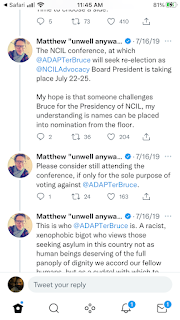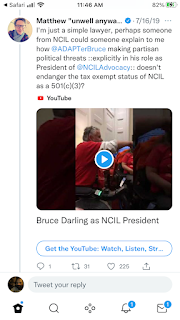The full page in the picture above from a public library microfilm collection of out-of-business local newspapers, and the column pictured below, blame immigrants for the problems of poor and disabled citizens accessing primary and specialized health services that private health insurance won't pay for. Medicare and Medicaid are constrained by taxpayer greed. The article correctly points out that the wealthy are less harmed by immigration than poor and disabled citizens. Wealthy people have benefited from regressively lower effective top marginal income tax rates that have been reduced, since the 1950's, by tax cuts of mostly Republican presidents and Congressional majorities under Presidents Reagan, W Bush and Trump.
By 2012 the author of this 2003 column in the out of business Montgomery/Prince George's Journal and Express had been quoted citing a link between living with a mental health disability and poverty.
To paraphrase Randy Bosin, a peer/survivor advocate and NAMI member … “no economic recovery for peer/survivors, no wellness!” To which I would add that the problem is one of economics and the social stigma that’s attached to unemployed and poor people; accordingly, the solution is political. More on this below.
That a relationship exists between poverty and mental illness was first established in the landmark New Haven study conducted by Hollingshead and Redlich (10), whose findings were published in 1958. Their principal conclusion was that there is a significant relationship between social class (SES or socio-economic status) and mental illness as regards the type and severity of the illness suffered as well as the type and quality of the treatment provided. Specifically, persons who were members of the lowest social stratum were the poorest, had a higher incidence of presumed serious mental illness and received the least adequate forms of treatment if they received any treatment at all. What was not clear was the direction of their findings, i.e., which phenomenon, mental illness or poverty, preceded which.
The unfortunate division of poor and working class people based on national origin and citizenship or immigration status from 2001 to 2003 in Maryland's largest county would occur again in 2019. The Disability Integration Act was being lobbied for by activists at the same time as the Trump administration was cruelly separating children from parents of undocumented immigrants. The cruel law enforcement policy was an attempt to deter immigration rather than deal with the root causes of immigration. The Disability Integration Act was the third legislative attempt to codify the 1999 Olmstead vs LC and EW supreme court decision after the failure of the CLASS Act by 2012.
Bruce Darling a leader of ADAPT was forced out of his NCIL position after he claimed that Democratic party members of congress MOCs care more about undocumented immigrants [deleted tweet screenshots of deleted tweets below]
than citizens with disabilities.
One of the activists there was Bruce Darling from Rochester, the
Executive Director of that city’s Center for Disability Rights (CDR) and
the Board President of the National Council on Independent Living
(NCIL). Darling is a long-time and highly visible ADAPT organizer.
Another was Dawn Russell, also a very experienced and well-known leader,
from Denver. Also present was Dara Baldwin, a D.C.-based disability
leader who works for CDR and has played a key role in coordinating the
disability community’s efforts on passing the DIA. As is ADAPT’s custom,
activists posted a livestream on the National ADAPT Facebook page and
an audience watched from home.
While the group was in Representative Eshoo’s office, Darling made
statements that attracted attention. About 14 minutes into the video, he
said, “Our talking point is, ‘Democrats care more about people who are
not legally in this country than their own citizens who are disabled.’
It really is what the message is here. That basically [pointing to
different disabled activists] you and you and you and you, you are less
than. You are not worthy. We are more concerned about immigrants who
happened to come here in a non-legal manner than we are with our own
citizens, and we will lock disabled people up. This is going to be the
message from the dais at the [NCIL] conference. This is not what
Democrats want. It’s not what we want.” Viewers in the disability
community began to contact their friends. “Are you watching ADAPT? Did
you see what Bruce said?” The group was gone from Eshoo’s office by the
time I was alerted to the video, and several of my friends and I
discussed what to do. Eventually, I tweeted. I may have been the first
to do so or I may have just been the first to be seen by people whose
retweets were widely read. I said that Darling had “suggest[ed] that
disabled people with and without citizenship are in a competition for
justice” and that he was “speaking on my behalf without my consent.” I
denied that he – or anyone – had the authority to say that in my name.
More deleted tweets from @mattbc here that followed the first two tweets in a thread. In addition to calling out the racism in what Bruce Darling said, dividing people with disabilities by national origin and immigration status, @mattbc was protecting the 501c3 status of the NCIL from challenge by demanding Bruce Darling be removed from a board and encouraging people to vote him out of the NCIL presidency.



Bruce Darling repeated the same 2003 talking points dividing poor and working class people by the protected classes of disability, national origin and immigration status. Bruce Darling failed to connect issues of poverty that intersect with civil rights law protected classes like disability, race and national origin/immigration status that are related to poverty as well as Randall Bosin did between 2003 and 2012.
Most of the activism that demanded the Disability Integration Act, as well as the Community Choice and CLASS Acts, has coalesced around the caregiving funds in the Build Back Better reconciliation covid19 relief bill that has been cut from $250 Billion to $150 Billion. Opposition from D WV Joe Manchin and D AZ Kyrsten Sinema to passage has stalled BBB and its caregiving funds perhaps for the rest of the 2022 second session of Congress that ends in January 2023.









No comments:
Post a Comment